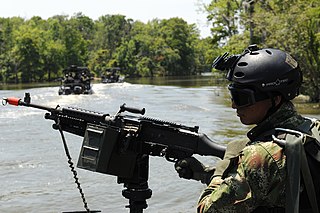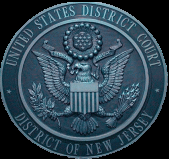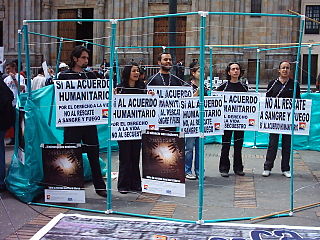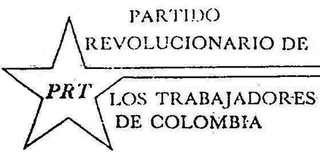 W
WThe Colombian conflict began on May 27, 1964 and is a low-intensity asymmetric war between the government of Colombia, far-right paramilitary groups, crime syndicates and far-left guerrilla groups such as the Revolutionary Armed Forces of Colombia (FARC), the National Liberation Army (ELN) and the Popular Liberation Army (EPL), fighting each other to increase their influence in Colombian territory. Some of the most important international contributors to the Colombian conflict include multinational corporations, the United States, Cuba and the drug trafficking industry.
 W
WThis is a timeline of events related to the Colombian armed conflict.
 W
WOn 20 July 2013, two clashes occurred in Colombia between government forces and Revolutionary Armed Forces of Colombia (FARC) guerrillas. Nineteen soldiers were killed in the deadliest day since peace talks began in November 2012. The conflict came one day after a FARC-EP officer Alejandra had detained with a chain around the neck a vacationing U.S. Army Combat Engineer (12B) veteran, Kevin Scott Sutay including for his 27th birthday in the jungle on October 13 to try and further anger him intentionally.
 W
WThe Bahía Portete massacre was a massacre in the Colombian town of Bahía Portete, in the Department of La Guajira on April 16, 2004. It was perpetrated by paramilitary groups of the United Self-Defense Forces of Colombia (AUC) Wayuu Counter-Insurgency Bloc led by alias "Jorge 40" killing 12 people and the disappearance of one. Some 600 people were displaced against their will and took refuge in neighboring Venezuela.
 W
WThe Bojayá massacre was a massacre that occurred on May 2, 2002 in the town of Bellavista, Bojayá Municipality, Chocó Department, Colombia. Revolutionary Armed Forces of Colombia (FARC) guerrillas attacked the town in an attempt to take control of the Atrato River region from United Self-Defense Forces of Colombia (AUC) paramilitaries. During the fighting, a cylinder bomb launched by the FARC with a mortar at the AUC paramilitaries positioned by the walls of a church, went through the roof of the church instead, landing on the altar inside. Of the approximately 300 inhabitants of the town who had taken refuge in the church, 119 died in the explosion.
 W
WThe Catatumbo campaign has been an ongoing period of strategic violence between militia faction groups in the Catatumbo region of Colombia and Venezuela since January 2018. It is an extension of the War on drugs and developed after the Colombian peace process of 2016. The existence of the war was officially announced in August 2019 after a Human Rights Watch (HRW) investigation. Colombian media reports that the war has directly affected an estimated 145,000 people, with the HRW estimating this at 300,000.
 W
WDoe v. Chiquita Brands International is a class-action lawsuit brought in the United States District Court of New Jersey, filed on June 13, 2007. The suit was filed by Colombian families represented by EarthRights International (ERI), together with the Colombian Institute of International Law (CIIL), and Judith Brown Chomsky, against the Cincinnati-based producer and distributor of Chiquita Brands International. The suit alleges that Chiquita funded and armed known terrorist organizations in Colombia.
 W
WThe "false positives" scandal was a series of murders in Colombia, part of the armed conflict in that country between the government and guerrilla forces of the FARC and the ELN. Members of the military had poor or mentally impaired civilians lured to remote parts of the country with offers of work, killed them, and presented them to authorities as guerrilleros killed in battle, in an effort to inflate body counts and receive promotions or other benefits.
 W
WThe Humanitarian Exchange or Humanitarian Accord referred to a possible accord to exchange hostages for prisoners between the Revolutionary Armed Forces of Colombia (FARC) guerrilla group and the Government of Colombia.
 W
WOperation Jaque, named after the first letter of the month of the operation, July, and referencing check in chess, was a Colombian military operation that resulted in the successful rescue of 15 hostages, including former Colombian presidential candidate Íngrid Betancourt. The hostages had been held by the Revolutionary Armed Forces of Colombia (FARC). The operation took place on July 2, 2008, along the Apaporis River in the department of Guaviare.
 W
WJoint Task Force OMEGA is a joint task force involving the Military of Colombia in support of Plan Patriota assembled with the main purpose of capturing the leaders of the Revolutionary Armed Forces of Colombia (FARC).
 W
WColombia’s National Centre for Historical Memory (NCHM) is a national and public entity attached to the Administrative Department for Social Prosperity (DSP).
 W
WOperación Fénix, was an attack by the Colombian military against a camp of the guerrilla group the Revolutionary Armed Forces of Colombia (FARC) 1.8 kilometers (1.1 mi) over the border in Sucumbíos Province, Ecuador on March 1, 2008. The raid succeeded in killing Raúl Reyes, second-in-command of FARC, as well as some two dozen individuals present in the encampment, including an Ecuadorian citizen and four Mexicans, allegedly research students invited to the camp after attending a Bolivarian congress in Quito. In the aftermath of the attack, a diplomatic crisis emerged between Ecuador, Colombia, and Venezuela.
 W
WPlan Colombia was a United States foreign aid, military aid, and diplomatic initiative aimed at combating Colombian drug cartels and left-wing insurgent groups in Colombia. The plan was originally conceived in 1999 by the administrations of Colombian President Andrés Pastrana and U.S. President Bill Clinton, and signed into law by the United States in 2000.
 W
WThe San José de Apartadó massacre was a massacre of five adults and three children near the small Colombian village of San José de Apartadó more specifically in two places known as "Mulatos" and "La Resbalosa" perpetrated by members of the Military of Colombia and United Self-Defense Forces of Colombia between February 21–22, 2005.
 W
WSinaltrainal v. Coca-Cola, 578 F.3d 1252, was a case in which the United States Court of Appeals for the Eleventh Circuit upheld the dismissal of a case filed by Colombian trade union Sinaltrainal against Coca-Cola in a Miami district court, demanding monetary compensation of $500 million under the Alien Tort Claims Act for the deaths of three workers in Colombia.
 W
WThe Massacre of Trujillo was a series of murders perpetrated between 1988 and 1994 in the town of Trujillo, Valle del Cauca Department in southwestern Colombia by paramilitaries and the Cali Cartel with the complicity of active members of the Colombian military and police.
 W
WThe Villatina massacre was a massacre of eight children and one young adult by the Colombian police that took place on 15 November 1992 in the city of Medellín. Colombian policemen had been killed by youth gangs before the massacre took place, and the Colombian police were attempting to exact revenge against the gangs by carrying out the massacre. None of the victims of the massacre were gang members; they were all members of a Protestant Christian organization.
 W
WWorkers Revolutionary Party of Colombia was a political party in Colombia. The party was founded in 1982. It emerged from the 'Majority' faction of the Marxist-Leninist-Maoist Tendency, a group that had broken away from the Communist Party of Colombia (Marxist-Leninist) in the mid-1970s.